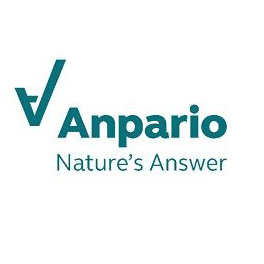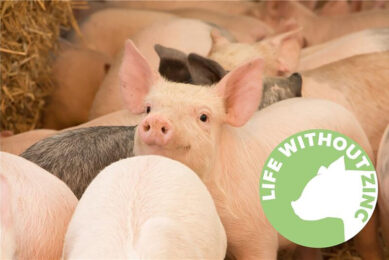Swine Dysentery: Strategies for support and mitigation
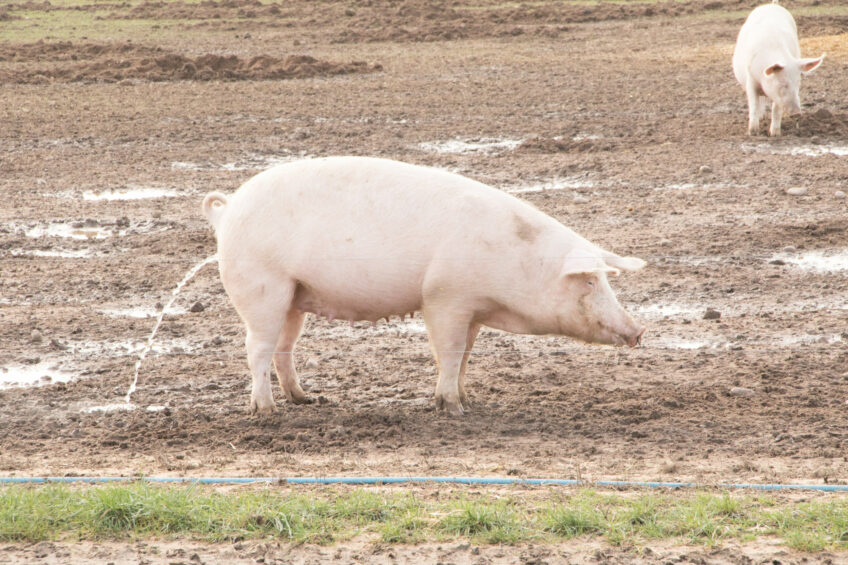
Swine dysentery remains a challenge in many areas causing highly significant economic losses as well as implied welfare concerns. Several strategies can be implemented to support the prevention of swine dysentery.
Swine dysentery is a severe infectious illness caused by the bacteria Brachyspira. With different Brachyspira strains varying substantially in severity (Table 1).
Table 1- Overview of Brachyspira strains.
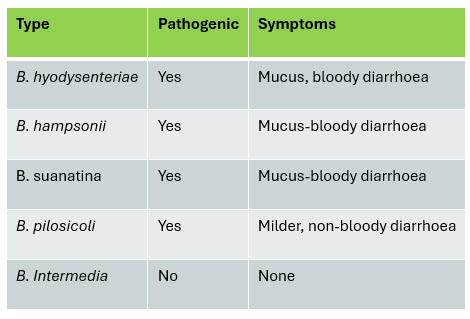
The disease is characterised by significant inflammation of the large intestine and associated bloody, mucus-containing diarrhoea. Whilst swine dysentery only occurs in swine, the bacterial agents can infect and persist in other species including rodents, where the bacteria can be shed in faecal matter, causing environmental reservoirs that can subsequently infect swine.
Global challenge
Swine dysentery is a worldwide challenge, generally occurring in the major swine producing regions and whilst outbreaks can occur at any time of year, summer outbreaks are often more frequent. The bacteria agent is gram-negative, anaerobic and many pathogenic strains cause significant damage to the red blood cells. Infection in swine can be transmitted by environmental contact, other animals and contact with infected faeces, making good sanitisation and general biosecurity essential.
Brachyspira can survive in the environment for extended periods of time and can be shed by other species for as long as 180 days. In swine, carrier pigs can infect others for at least 90 days post-infection. Often introducing new animals that are clinically normal at the time of introduction can be the initial source of an outbreak and Sows can subsequently transmit infection to piglets.
Infection occurs via ingestion and clinical signs typically develop within 5-21 days with this varying depending on the exposure level, however, the minimum infectious dose is very small. Once the bacteria reaches the hind gut it colonises and proliferates, penetrating the mucosal layer and forming lesions. Electrolyte imbalances occur causing the pig not to absorb water, leading to severe dehydration and high mortalities.
Clinical Signs
Grey to yellow, mucus-containing diarrhoea is generally the first symptom observed. This typically progresses to also contain blood. When dehydration occurs pigs may have sunken eyes, hollow flanks and may be obviously weak. Mortalities as high as 50% can occur if left untreated.
Prevention
Preventing swine dysentery is considered by far the best strategy as it mitigates environmental contamination and re-infection from carrier pigs which can be very difficult to overcome. The disease is also notifiable in some regions, requiring producers to report any suspected cases to their local legislative body. Where cases are confirmed, movement of animals may be restricted for a period of time, causing additional costs and delays in production.
Several strategies are recommended to support the prevention of swine dysentery:
- Quarantine new animals for 30-60 days before general integration into the herd.
- Thorough and regular removal of faecal matter followed by comprehensive cleaning with an antimicrobial product such as Credence has been shown to kill persistent Brachyspira bacteria within the production facility environment.
- Sanitisation with an effective antimicrobial disinfectant will limit environmental burden.
- Ensure good rodent prevention to limit cross-contamination with carrier species.
- As ingestion of the bacteria is required for infection, particular care should be taken with feed and feeding equipment. Applying an effective feed mitigation product (organic acid-based product) as pHorce has been shown to kill Brachyspira bacteria in the feed preventing the bacteria being consumed by the pig.
- Oregano essential oil products such as Orego-Stim has been well demonstrated to be effective against Brachyspira.A recent study looked at a confirmed swine dysentery outbreak. All pigs were given an intra-muscular injection of Tiamulin, then half were supplemented with 500g/t of 5% oregano essential oil and half were fed a standard control diet. All pigs were re-tested for infection 5 days and 30 days after the antibiotic treatment. The study found that when oregano was supplemented none of the pigs tested positive for swine dysentery at either time point compared to 19.51% and 62.5% of the control group (Figure 1).
Figure 1- Infection rate following antibiotic treatment (Tiamulin).
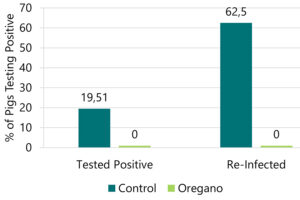
The piglets also had substantially improved average daily gain at day 30 post-antibiotic treatment compared to the control (Figure 2).
Figure 2 – Average daily gain day 0-30 post antibiotic treatment.
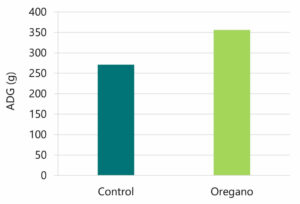
Finally, piglets supplemented with Oregano suffered with diarrhoea for approximately half the time of the control treatment (Figure 3).
Figure 3- Number of days with diarrhoea following antibiotic treatment.
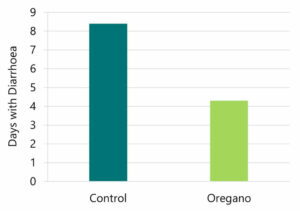
Oregano
Overall, the supplementation of oregano fully mitigated re-infection following antibiotic treatment with Tiamulin as well as improving performance and limiting the symptoms of swine dysentery.
When used in combination with optimal biosecurity and mitigation products, the use of oregano can act as an effective preventative against swine dysentery.


